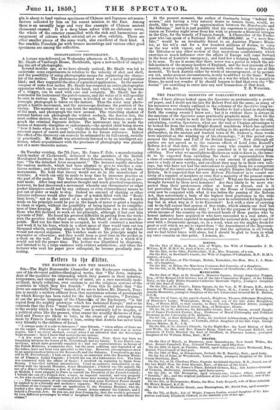INSTANTANEOUS PHOTOGRAPHY.
A lecture was delivered on Wednesday afternoon at No. 5, Haymarket by Mr. Skaife of Vanburgh House, Backheath, upon a new method of employ- ing the art of photography.
beveral months ago, as we have already noticed, Mr. Skaife was led to undertake some experiments in relation to the velocity. of shot and shell, and the possibility of using photographic means for registering the charac- ter of the motion. The phenomena presented were of a novel and peculiar kind ; and they suggested the idea of a practical application. In the narrow compass of some four inches Mr. Skaife has resumed an entire photographic apparatus which can be carried in the hand, and which, working by means of a trigger, can be used with ease and certainty. Mr. Skaife has de- nominated Ins instrument the pistol-camera, and the value of it will speedily be seen in various way. The weapon is levelled at an object, and a mi- croscopic photograph is taken on the instant. Thus the scout may photo- graph a hostile movement, and the microscope discloses the position of the enemy. The mariner at sea can hoist the machine to the very vane at top of the mast, and photograph the view around. The travelling student of natural history can photograph the wildest roebuck, the fiercest lion, the most sudden meteor, the moat inaccessible rock. The watchman can photo- graph the criminal tlagrante delicto. The instrument may be made the means of domestic discipline or endearment,—the spoiled child being shown " how it looks when it is cross " ; while the enchanted suitor can catch the sweetest aspect of assent and immortalise it for future reference. Indeed the effect of the discovery can scarcely be estimated to its full extent, socially or practically. Mr. Skaife was attentively listened to by an intelligent au- dience, whose acquaintance with the processes of photography was plainly not of a mere theoretic nature.
On Tuesday evening, the 7th June, Mr. James F. Cole, a manufacturing watch-maker of Clerkenwell, delivered to the members of the British Horological Institute in the Amwell Street School-rooms, Islington, a lec- ture "On the detached lever escapement." The lecturer rapidly sketched the various methods, which had been adopted to give to watches a con- tinous motion Land the relative value of Graham's, Mudge's, and the fusee movements. He held that theory would not do in the manufacture of watches. A watch can only be made to keep time by immense practice on the part of the maker. The best chronometers are liable to stop as at pre- sent made. After long and anxious thought and much practical experience, however he had discovered a movement whereby any chronometer or other pocket timepiece could not by any ordinary or even extraordinary means be put out of order or made to stop. Indeed no amount of shaking or other exterior influence would alter the time of a watch fitted with the " Resil- lient lever" not to the extent of a minute in twelve months. A watch made on his principle could be put in the hands of never so great a bungler to clean or repair, without the possibility of being injured in its complete- ness of time keeping. He would gladly print directions on a few cards for those who felt inclined to work on his principle, although it had cost him upwards of 2001. He found his greatest difficulty in getting from the work- men the peculiar tooth wheel upon which the whole of the movement de- pends. Had not his time been so occupied, be would construct a machine and work it by his boys, which in a short space of time would turn out ten thousand wheels, requiring simply to be brushed The price of the wheel would not exceed sixpence. The watches made on his principle might be expensive or otherwise ,• and they would keep as good time in the pocket as a clock on the wall. For himself he objected to finery in a watch if it would not tell the proper time. The lecture was illustrated by diagrams, and listened to by a large audience with evident satisfaction ; and when the lecturer who read his paper grew colloquial, he became peculiarly inte- resting.


























 Previous page
Previous page